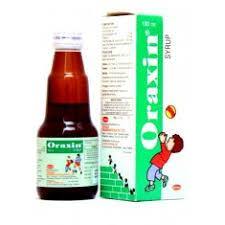Share this post
Oraxin Syrup is a combination of three medicines namely cyproheptadine, sorbitol, and tricholine. It belongs to a group of combination medicines called 'appetite enhancer' used to stimulate the appetite and treat alimentary tract and metabolism problems.
HOW ORAXIN SYRUP WORKS
Oraxin Syrup works by decreasing the effect of a chemical messenger which controls appetite. Tricholine citrate is a bile acid binding agent which removes bile acids from the body. The liver then produces more bile acids using cholesterol, as a result of which cholesterol level is lowered. Sorbitol acts as a syrup base and also as an osmotic laxative to relieve constipation.
USES OF ORAXIN SYRUP
- It helps to treat weight loss.
- Oraxin Syrup enhances food consumption
- It also helps in fulfilling nutritional needs
- Oraxin Syrup serves as a major appetite stimulant
- It helps to manage malnutrition
DOSAGE USE OF ORAXIN SYRUP
Oraxin Syrup is taken with or without food in a dose and period as advised by the doctor. Check the label for directions before use. Measure it with a measuring cup and take it by mouth. Shake well before use. The dose you are given will depend on your condition and how you respond to the medicine.
- Each tablet contains 4 mg of Oraxin hydrochloride.
- Pediatric Patients - (Age 2 To 6 Years)
The total daily dosage for pediatric patients may be calculated on the basis of body weight or body area using approximately 0.25 mg/kg/day or 8 mg per square meter of body surface (8 mg/m2).
The usual dose is 2 mg (1/2 tablet) two or three times a day, adjusted as necessary to the size and response of the patient. The dose is not to exceed 12 mg a day.
- Age 7 To 14 Years
The usual dose is 4 mg (1 tablet) two or three times a day adjusted as necessary to the size and response of the patient. The dose is not to exceed 16 mg a day.
- Adults
The total daily dose for adults should not exceed 0.5 mg/kg/day. The therapeutic range is 4 to 20 mg a day, with the majority of patients requiring 12 to 16 mg a day. An occasional patient may require as much as 32 mg a day for adequate relief. It is suggested that dosage be initiated with 4 mg (1 tablet) three times a day and adjusted according to the size and response of the patient.
What happens if you miss a dose?
If you miss a dose of Oraxin Syrup, take it as soon as possible. However, if it is almost time for your next dose, skip the missed dose and go back to your regular schedule. Do not double the dose.
You should keep taking this medicine for as long as your doctor recommends. Let your healthcare team know about all other medications you are taking as some may affect, or be affected by this medicine.
 SIDE EFFECTS ODF ORAXIN SYRUP
SIDE EFFECTS ODF ORAXIN SYRUP
The most common side effects are:
- Black or Tarry stools
- Blurred vision
- Constipation
- Drowsiness
- Dryness in mouth
- Nausea
- Sleepiness
- Vomiting
- Weakness
Some side effects do not require any medical attention and disappear as your body adjusts to the medicine. Contact your doctor straight away if you are concerned about any of these. Avoid drinking alcohol while taking this medicine as it can worsen your sleepiness.
YOU ARE NOT TO USE THIS MEDICATION IF YOU HAVE:
- A baby to breastfeed
- Asthma
- Bladder neck obstruction
- Glaucoma
- Heart problems
- High blood pressure
- Hyperthyroidism
- Intraocular eye pressure
- Nausea
- Peptic ulcers
- Prostatic hypertrophy
- Pyloroduodenal obstruction or
- Stomach pain
If you are pregnant, consult with your doctor first before using this syrup.
DRUG INTERACTIONS OF ORAXIN SYRUP
Oraxin Syrup is likely to have interactions with:
- An antihistamine e.g. Diphenhydramine Orcetirizine
- An antidepressant e.g. Duloxetine, Fluoxetine, or Sertraline
- Anti-convulsants e.g. Pregabalin or Topiramate
- Anti-psychotics e.g. Quetiapine
- Medicines for hepatitis B infection e.g. Lamivudine
There are no food-Drug Interactions found or established for this syrup.
COPING WITH ORAXIN SYRUP
- It may cause dizziness and drowsiness. Use caution while driving or doing anything that requires concentration.
- Avoid consuming alcohol while taking this medicine as it can cause excessive drowsiness and increase your risk of stomach problems.
- Dry mouth may occurs as a side effect. Frequent mouth rinses, good oral hygiene, increased water intake and sugarless candy may help.
TIPS ON MAINTAINING A HEALTHY DIET AND LIFESTYLE
- Change your menu and eat food that you love.
- Exercise frequently as it aids in increasing your energy expenditure, in so doing helps in increasing hunger.
- If you have trouble obtaining, preparing food, or having difficulty with limited food choices, try delivery services that deliver fully prepared healthy meals.
- Include calorie-containing beverages in your diet, such as protein shakes, fruit juices, milk, etc.
- Limit excessive snacking in between mealtimes.
- Proper management of basic hygiene and bowel regularity can positively affect appetite in adults.
- Setting the alarm for mealtime or posting a meal schedule on the wall could help adults remind them to eat.
- Try not to skip meals. Make time for eating.
- You may eat more if you are having a good time during your meal. So, try to make mealtimes enjoyable by eating with friends, family, or watching a favorite show.

Sanni Muritador is a content writer with years of experience. He started his writing career working for opera news. His hobbies include writing, reading, and playing tennis.
I read anything and everything available so I know so many useful and useless things.
Want to connect with Sanni Muritador? Reach out to him on Facebook @Muritador Sanni.
